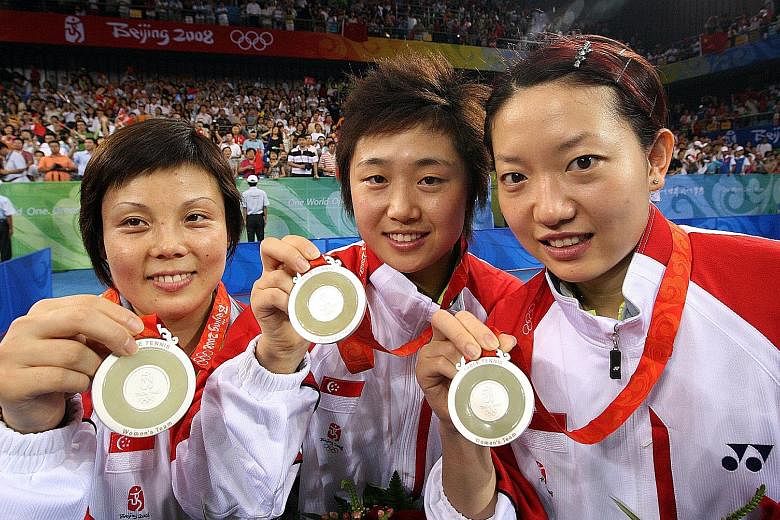The (Singapore table tennis) team's third and last request to Project 0812 was to ask for help to get better players. At the start of Project 0812 in 2006, the three main women's singles players were Li Jiawei, Sun Beibei and Zhang Xueling.
Although they managed to win a silver medal at the Doha Asian Games, the Singapore Table Tennis Association (STTA) felt that it was not a strong enough team to repeat the feat in Beijing.
"I was a bit worried that the second and third singles were not so strong," said Choo Wee Khiang, then the president of the STTA.
It led to a slight shift in the foreign talent strategy. Instead of bringing in semi-finished products, the association began searching for more polished imports. That led it to two players: Wang Yuegu and Feng Tianwei.
Wang was a former China national team player - the first in Singapore since Jing Junhong - who had suffered an injury and was dropped. While playing in Japan's professional league, she was spotted by the STTA and invited to come to Singapore. Said Choo: "My thinking, initially, was to bring them in as sparring partners. But I soon realised they were very good."
Wang's results were stunning. In September 2006, a year after she arrived in Singapore, she won her first Pro Tour event at the Japan Open. The victory was especially eye-catching because she beat China's world No. 3 Guo Yan in the final.
The win sent her into the world top 10 rankings. Two months later, she sent a loud message to her new adopted home when she beat Li to win the German Open.
Wang was not content to be in Singapore as a sparring partner. She was good enough to be in the national team and could even be the country's top player. In January 2007, she became a Singapore citizen.
"It was a recognition from the country and the Government," she said. "I had shown I had the 'qualifications' to play in the Olympics. But it was not a given. I knew there was still a long way to go."
With the second singles in place - or even a potential rival for the top singles place - the STTA started scouting for the elusive third singles. Again, it found fertile ground in Japan.
A former Chinese national youth team player, Feng Tianwei, had also been dropped from the Chinese set-up and, like Wang, was pursuing a second career in the Japanese league.
Singapore's national head coach Liu Guodong, who signed up with the STTA in early 2006, had spotted her in China some years back and felt that she was the missing piece in the emerging puzzle.
He said: "Before Tianwei came, I spoke to Mr Ng Ser Miang about our medal chances and I said that it was about 20 per cent to 30 per cent. But with her, it could go up to 70 to 80 per cent. I felt that we needed a young, promising player to play the third singles and she fitted the bill."
In 2006, Feng was only 20 years old. "I saw her play in China a few years ago and I could tell from her eyes, fighting spirit and strength, that this child had something special," said Liu.
In April 2007, only 14 months before the Beijing Olympics, Feng arrived in Singapore. She had only one aim - to play in the Olympics. But for a player who had never played on the Pro Tour circuit, she was a long way from obtaining enough points to qualify. "I didn't have a world ranking," she said. "I was a blank sheet of paper."
Worse, she had no experience in major tournaments. "I had to be put on a short runway. No time to take a slow path," she said. "There was intense pressure, especially for the coach who wanted to use a newbie like me. You can imagine the stress I felt from different quarters."
She dealt with it superbly. After three Pro Tour events, she climbed more than 850 positions to a respectable world No. 73 ranking. In a report by the STTA to Project 0812 at the end of the Beijing Games, she was described as a "phenomenon" for her astonishing climb up the charts.
By October 2007, she had made it to the final of the Chinese Taipei Open and finished second to team-mate Li. Three months later, she became a Singapore citizen.
"I was most happy and relieved when I received the passport," she said. "I had the admission ticket to the Olympics. I had the qualifications to contest. With the passport, I could compete with my team-mates for a place."
In March 2008, the ping-pong world took notice of this little-known player when she stunned world No. 1 Zhang Yining in the Asian Cup quarter-finals.
"I couldn't believe it," she recalled. "I thought it was inconceivable. Zhang wasn't just a world champion. She was a flag-bearer of the sport. Even the Chinese players could not beat her and yet me, a foreign player, managed to do it. In the eyes of many in the table tennis world, she had been put on an altar. She was so good that it was as if she belonged to another celestial realm altogether."
Feng, who finished second in the tournament behind another Chinese player, Guo Yue, had given Singapore a tremendous boost.
"The reaction to my victory over Zhang Yining was very strong," she said. "It was felt by many in the table tennis circuit that Singapore had the confidence to get a medal in Beijing. It made us even more sure of a medal at the Olympics."
But there were a few more hurdles for the team, including a massive rupture in team dynamics, before they could reach for the elusive dream in the Chinese capital.
• The book can be ordered online at www.selectbooks.com.sg

